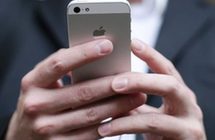正文
苹果新专利:再不怕英文自动修正闹笑话了
It's a curse that has serially embarrassed smartphone users. The iPhone's autocorrect function, which aims to fix touchscreen typists' inaccurate spelling, intervenes at precisely the wrong moment, correcting “hungry” to “horny” or making texters promise to “walk their dad”.
仿佛遭到诅咒一般,不断有人因智能手机的自动修正而陷入尴尬境地。iPhone的自动修正功能本意是修改触屏使用者打错的字词,结果却大相径庭,比如将“hungry(饥饿的)”自动修正成“horny(淫荡的)”,或者导致发信息者要“walk their dad(遛爹)”。
But Apple may have a solution. The company has filed a patent for a fix that would see message recipients warned that the sender's words have been automatically corrected, preventing the confusion of seeing an incoherent or rude message.
不过苹果公司已经找到应对之策。苹果近日申请了一项专利,该专利会告诉信息接收者,哪些发过来的词经过对方手机的自动修正,防止因文不对题或粗鲁字眼造成任何误会。

Currently, autocorrected words are presented in the same way as any other word, both when messages are being written and read.
目前,无论从发信息端还是收信息端来看,自动修正过的词都和其他字词是完全一样显示的。
Apple's proposal is that they would be highlighted using an underscore in both the typing window and when read by its intended target, distinguishing an autocorrected word from any other.
苹果的新专利显示,他们会在发信息端和收信息端,用下划线的方式突出显示经过自动修正的字词,使它们区别于其它字词。
So, for example, when autocorrect censors a message to “I can't ducking believe it”, the recipient will have more of an idea of what was intended. If the sender spots the mistake, a clarify-and-resend button would allow them to easily correct it.
比如,当系统自动修正了一句话,使之变为“I can't ducking believe it”,收信息端就会大概知道对方要表达什么意思了(因为有下划线)。如果发信息方看到了这个错误,系统还配有“修改并重发”按钮,可以让他们轻松改正这个错误。
那些年,自动修正犯过的错:
1. A traveller's surname was corrected from "Moss" to "Miss" when booking a flight. The airline refused to allow for the error, costing the unfortunate passenger £600
一位出行者订机票时,其姓氏的"Moss"被自动修正成"Miss"。结果航空公司因为这个错误拒绝让其登机,导致这位不幸的乘客损失了600英镑。
2. A mother who asked a cake shop to make a birthday cake with a "wee blond girl" for her daughter was surprised to receive one with a girl holding a white cane after the crucial word was corrected to "blind"
一位母亲给女儿订蛋糕时,要求蛋糕店制作一款主题为“金发小美女”的蛋糕。谁知收到的蛋糕上,竟然是一个小女孩手拿白色拐杖——原来关键的"blond(金发的)"一词被修正成了"blind(盲人的)"。
3. An enterprising teenager who knew his parents would deny his request to host a party changed autocorrect on their phones so that "no" was automatically converted to "HELL YES".
一位不达目的誓不罢休的少年,料到父母不会同意他办聚会的提议,于是修改了父母手机上的自动修正设置,使"no(不行)"一词被自动修改为了"HELL YES(当然没问题)"。
4. A 16-year-old daughter who received a text from her mother asking "What do you want from life". The teenager and her father spent five minutes debating the profound question, until a second message corrected it to "Lidl"
一位16岁的姑娘收到了母亲发来的短信:"What do you want from life(你想从生活中得到什么)"。这位姑娘和父亲一起花了5分钟研究这个深奥的人生命题,结果母亲又发来一条更正短信,她其实想说的是:"What do you want from Lidl(你们想让我从里德尔商店带点什么)"。




 手机网站
手机网站